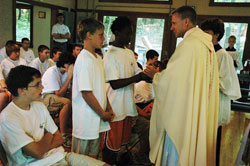Youth Supplement
Trust in God when his call to serve comes

Father Rick Nagel, associate vocations director for the archdiocese, receives offertory gifts from, at left, Patrick Durcholz, a member of Annunciation Parish in Brazil, and Kevin Chambers, a member of Holy Trinity Parish in Indianapolis, during a Mass celebrated on June 14 at Bradford Woods in Morgan County. The Mass was part of Bishop Bruté Days, a retreat focused on the priesthood that was sponsored by the Bishop Bruté College Seminary at Marian College in Indianapolis. (File photo/Sean Gallagher)
By Kirk Meyers (Special to The Criterion)
For almost 2,000 years, men have been called to serve the Church as representatives of Christ. Whether assigned to a parish or serving a religious order, these men have given their lives to spread God’s message to his people. They have been called shepherds and fishermen, and have been role models to many people throughout time. These men are priests.
The word “priest” is derived from the Greek “presbyteros,” meaning elder. This term is meant as a male person called to the immediate service of God and authorized to hold public worship, especially to offer the sacrifice of the Holy Eucharist.
As you can see from the definition of priest, the priesthood should not be taken lightly. It is a gift of God and a sacrament of the Church. This is why there is a period of discernment and studying before a man is ordained a priest.
Many spend this time in a seminary or a college associated with a seminary. A seminary is a place of study and prayer for men discerning the priesthood. They go there to learn what they need to know to be a priest. In the seminary, they learn theology and philosophy to assist them in formation with the Church in mind.
Priests also need to learn Church history, Church doctrine and Scripture. While they study for the priesthood, they can take classes and pursue majors that would educate them in other fields of interest.
Continually during this period, they ask God if they are truly called to be a priest.
The seminarians interviewed for this story are studying at the Bishop Bruté College Seminary at Marian College in Indianapolis.
Asked why he entered a seminary, archdiocesan seminarian Tim Wyciskalla said, “I have a great desire to serve the Church, especially sacramentally.”
Jeff Read, a seminarian for the Evansville Diocese, said he was attracted to the priesthood because it means “acting in the person of Jesus Christ.”
Most do not enter the seminary until something “calls” them toward the priesthood. Many may be called, but not all listen at first. For some, this call or discernment may be a long process. For others, it can happen in an instant.
Archdiocesan seminarian Aaron Thomas said he received help in his calling from his pastor and his family.
The question of discerning a priestly vocation may come at any age. There are saints that knew at very young ages that they wanted to be priests and serve God. One of these saints was St. Peter Claver.
Life experiences can also prompt changes of thought toward the priesthood. St. Augustine found his vocation after searching for more than 30 years.
A few seminarians said that men should be looking for their vocation at all times of their life. Others said that high school is a good place for teenagers to look toward the future and ask themselves if the priesthood is what God wills for them.
Promoting vocations to the priesthood is every Catholic’s responsibility. There is a great need for priests in the United States, and there are many ways to advocate discernment to the priesthood. All the seminarians agree that the best way to encourage the priesthood is to ask those that show promise and potential if they have ever considered the priesthood. Even if they say no, the thought will still be placed in their heart and mind. This may be all that God needs.
The seminarians also added that prayer is powerful, too. We should all take the time to pray for more men to pick up the call and follow his will.
Although the priesthood may be difficult for some, trust in the Lord will always help men to overcome any obstacle.
Asked if he was worried about becoming a priest, Wyciskalla said, “There is an element of fear, of unworthiness, in my discernment. However, I am always comforted by the fact that I can place all of my worries in Christ.”
We must always trust in God in whatever we do, as it says in
Proverbs 3:5-6, “Trust in the Lord with all your heart, on your own intelligence rely not; in all ways be mindful of him, and he will make straight your paths.”
(Kirk Meyers is a member of Annunciation Parish in Brazil.) †
